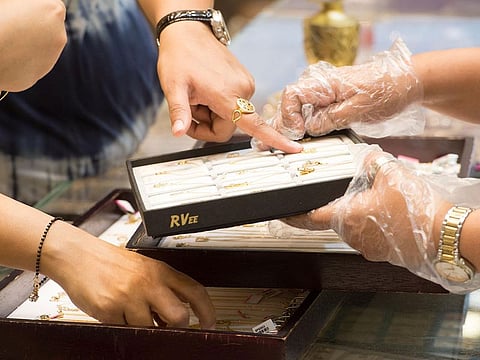Why Saudi families keep buying gold despite record prices
From weddings to savings, gold remains central to Saudi wealth and tradition

Dubai: For Saudi households, gold is more than a glittering accessory — it is a financial backbone, a cultural tradition, and a hedge against uncertainty.
Even as global demand for gold slumped earlier this year, Saudi consumers showed remarkable resilience, turning to the yellow metal in record volumes.
Gold as savings, security
In Saudi Arabia, jewellery often doubles as savings. Families purchase gold not only for weddings or religious festivals but also as a way to store wealth in a liquid, transferable form. It plays a key role in intergenerational wealth transfer, passed down as wedding gifts, or heirlooms that preserve financial security for the future.
Buying habits also vary across the Kingdom. In northern regions, around 70% of buyers treat gold as a pure investment, while in the south, purchases are more closely tied to tradition and adornment.
Defying price pressures
This came despite gold prices climbing above $3,500 per ounce, a 34% surge that would normally deter buyers.
While jewellery accounted for most purchases — 11.5 tonnes in Q1 — more Saudis are now stocking their safes with bars and coins. Investment-grade gold demand grew 15% year-on-year, reflecting its status as a safe haven asset.
Hedge against inflation
Economic headwinds are reinforcing this trend. With cost-of-living pressures and global market volatility, Saudi families view gold as protection against inflation. Its ability to hold value over generations makes it a preferred long-term store of wealth.
Younger Saudis are also reshaping the market. While they still value the cultural weight of physical gold, many are embracing modern investment tools such as digital gold platforms, fractional ownership, and exchange-traded funds (ETFs). This blend of tradition and technology highlights how gold remains relevant across generations.
How expat demand differs
In contrast, UAE and Indian expats see gold through a slightly different lens. Indian expatriates in particular use gold as a financial bridge between their resident country and India. When the rupee weakens against the dirham, gold purchased in the UAE becomes cheaper in rupee terms, making it an attractive hedge.
For this community, demand spikes around festivals like Diwali or during wedding seasons, but it is also highly sensitive to currency movements. Many Indian expats lean toward modern financial instruments such as gold ETFs or sovereign bonds, prioritising liquidity and portfolio diversification over cultural traditions.
Enduring value
Whether worn as jewellery or locked away as bars and coins, gold continues to hold a unique place in Saudi society. It remains both a cultural symbol and a financial safeguard — one that families trust to carry their wealth securely into the future, regardless of global price swings.
Sign up for the Daily Briefing
Get the latest news and updates straight to your inbox


